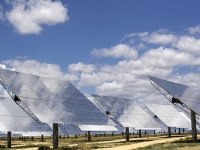
South America and the Caribbean to receive US$600 million funding for renewable energy projects
March 19, 2012 - Nilima Choudhury-
pv-tech.org
 |
| The International and Development Bank (IDB) and Japan International Cooperation Agency (JICA) have enetered a co-financing agreement to invest in renewable private-sector projects in South America and the Caribbean. |
|
The Inter-American and Development Bank (IDB) and Japan International Cooperation Agency (JICA) have entered a co-financing agreement worth US$600 million to invest in renewable private-sector projects in South America and the Caribbean.
Signed this week, the agreement will be a two-fold scheme. For joint co-financing, the IDB will be required to match financing provided by JICA. The Agency intends to provide US$300 million in concessional financing for projects, which would mean IDB would also have to offer US$300 million. The second option is parallel co-financing where each organization will separately finance specific components of an eligible project. All projects will be processed, approved and executed to meet with the IDB’s loan policies and procedures for joint co-financing.
The IDB has increased spending over the years due to an increase in demand from its borrowing members and to achieve its goal of 25% of total lending to represent climate change adaptation, environmental sustainability and renewable energy. According to the International Energy Agency, a 50% increase, by 2030, is expected in this region. This will require a global investment of up to US$1.5 trillion. Last year, the IDB had approved US$736 million in financing towards environmentally-friendly projects.
 |
| US$600 million will be invested via two joint co-financing schemes. |
|
“For more than 30 years, Japan has been a great partner of the IDB and, in particular of our borrowing member countries,’’ said IDB President Luis Alberto Moreno. “This agreement is another example of Japan’s efforts to help our region overcome key development challenges. This contribution, in addition to encouraging the adoption of climate-friendly energy investments, will support much needed mitigation measures to address the negative impacts of climate change among our most vulnerable nations in Central America and the Caribbean.”
 |
| The International Energy Agency is expecting a 50% increase by 2030 in the region. |
|
Toshitaka Takeuchi, energy specialist and technical contact for the agreement at the IDB’s energy division said, “We are considering potential projects in the areas of hydroelectric power plant rehabilitation, photovoltaic power generation, and installation of energy saving facilities and equipment. In addition we will explore financing opportunities for geothermal power generation considering its significant potential in
the region.”
“The Latin America and the Caribbean region is committed to reducing its greenhouse gas footprint,’’ said Hans Schulz, head of the IDB’s structured and corporate finance department, which is responsible for financing large scale projects in the private sector. “Several countries are beginning to develop their potential for wind, geothermal, bio energy production and solar energy, often through private sector leadership. The IDB provides access to tailored long-term financing, not readily available in local capital markets for these types of projects.”

| 




